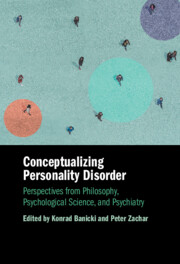 Conceptualizing Personality Disorder
Conceptualizing Personality Disorder Book contents
- Conceptualizing Personality Disorder
- Conceptualizing Personality Disorder
- Copyright page
- Contents
- Figures
- Tables
- Contributors
- Introduction
- Part I Historical Perspectives
- Part II Contemporary Approaches to Traditional Conceptual Perspectives
- Part III Novel Conceptual Approaches to Personality Disorder
- Part IV Exploring Negative Consequences of Diagnosing Personality Disorder
- Part V Perspectives on Borderline and Narcissistic Personality
- Index
- References
Introduction
Personality Disorder and the Philosophy of Psychopathology
Published online by Cambridge University Press: 25 June 2025
- Conceptualizing Personality Disorder
- Conceptualizing Personality Disorder
- Copyright page
- Contents
- Figures
- Tables
- Contributors
- Introduction
- Part I Historical Perspectives
- Part II Contemporary Approaches to Traditional Conceptual Perspectives
- Part III Novel Conceptual Approaches to Personality Disorder
- Part IV Exploring Negative Consequences of Diagnosing Personality Disorder
- Part V Perspectives on Borderline and Narcissistic Personality
- Index
- References
Summary
This is a general introduction to the book Conceptualizing Personality Disorder: Perspectives from Philosophy, Psychological Science, and Psychiatry. It describes two overarching goals of the book: to encourage more philosophers to tackle the complicated issue of personality disorder and to demonstrate to psychologists and psychiatrists the relevance of some philosophical theories and perspectives for conceptualizing personality disorder. It briefly summarizes each chapter of the book as divided into sections. The sections are (1) Historical Perspectives, (2) Contemporary Approaches to Traditional Conceptual Perspectives, (3) Novel Conceptual Approaches to Personality Disorder, (4) Exploring Negative Consequences of Diagnosing Personality Disorder, and (5) Perspectives on Borderline and Narcissistic Personality.
Information
- Type
- Chapter
- Information
- Conceptualizing Personality DisorderPerspectives from Philosophy, Psychological Science, and Psychiatry, pp. 1 - 4Publisher: Cambridge University PressPrint publication year: 2025